Oily Espresso Beans ⎮ How Oily Beans Can Ruin Your Superautomatic
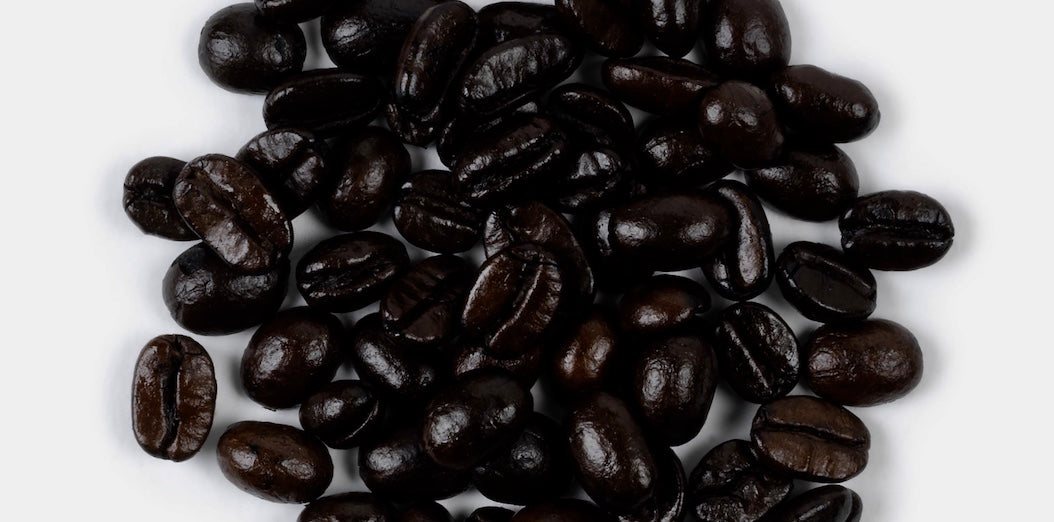
You love your espresso and you love the superautomatic espresso machines that makes it for you. To make sure nothing gets in the way between you and your perfect cup of coffee, ensure you are using the right beans in your superautomatic espresso machine to avoid any issues.
The very first thing you need to consider when you start using a superautomatic espresso machine is the type of beans you will be using. Two types of beans to avoid at all costs are flavored beans and oily beans.
Using beans that are flavored will forever compromise the taste of coffee your machine produces. If you use oily beans, it is not a matter of if, but when, your machine will experience the following issues.
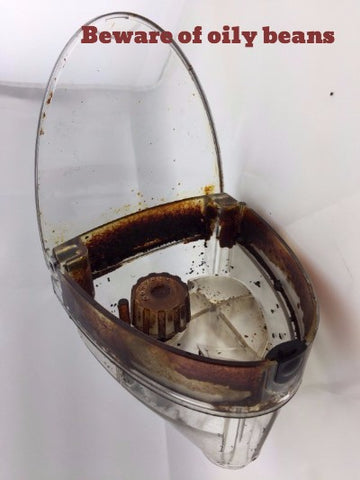
Issues that can occur if you use oily coffee beans
Grinder will become gummed up
Coffee grounds will stick together becoming compact and solid and create a clay pit in your grinder.
Beans will not grind properly or your grinder will keep on spinning but no beans are being ground, nor is coffee flowing from the grinder into the brew unit.
Screen on brew unit will become clogged.
The machine will not be able to produce a coffee. You may see unused coffee grinds in the dreg drawer.
Read on to discover how to choose perfect beans for your superautomatic. Just like cars perform best with certain grade gas, so will your coffee machine work best based with the beans you use.
What makes coffee beans oily?
All coffee beans contain oils. The roasting process is what draws oils to the surface of the bean. The longer beans roast, the more oils will appear on the surface of the coffee bean.
There is a misconception that an extra oily bean means it is fresher than a dryer one. The amount of oil is not a function of when a bean was roasted, rather the amount of time and temperature at which it was roasted.
Isn’t a dark roast needed to make espresso?
Those who enjoy espresso do so because they like a deep, bold and strong coffee. You can achieve a great espresso by using medium to medium dark roasts. Espresso aficionados know that the best espresso is achieved by blending coffee beans varieties. They correctly believe that beans are often-over roasted as a way to cover up flavor defects in inferior low-quality coffees.
Extremely dark roasts produce coffee that has a burnt smoky flavor which is not a desirable profile for an espresso or espresso-based drinks. Not only are extremely dark roasts not ideal for espresso, the long roasting process has killed the natural flavors of the beans and most importantly, this type of roast will also wreak havoc on your superautomatic espresso machine.
As a service center , we have machines come in regularly for repair as a result of using oily coffee beans. Don’t get me wrong: as a service centre, we love the business that clogged up machines brings our way. But when we inquire what coffee beans they have been using, we often hear learn they have been using either Kirkland or Starbucks beans.
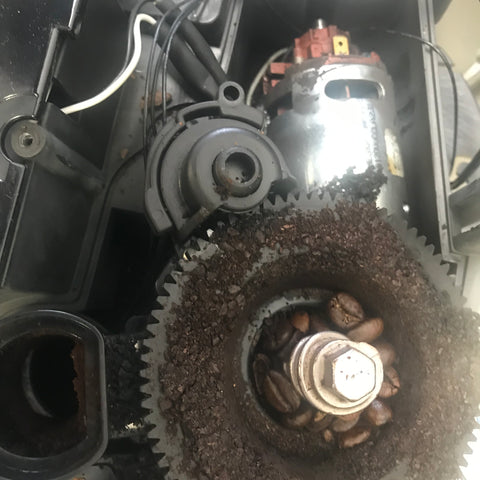
The other type of beans to avoid in your superautomatic espresso machines are flavored beans. These are beans to which additional aromatic oils or additional flavorings have been added. Once again these beans will have oils that will affect the operation of the espresso machine and just as important; the residual flavor they leave behind will become embedded and absorbed by the machine components and compromise the taste of all future coffees.
I would also suggest not using the bypass doser with ground flavored coffees. Although this coffee will bypass the grinder, it will still impact machine.The oils can clog the screen in the brew unit but more importantly the flavor will remain part of the machine for a very long time and compromise the other future coffees you will be making. Not to mention that this flavoring is achieved with the addition of chemical substances which should be avoided in all your food.
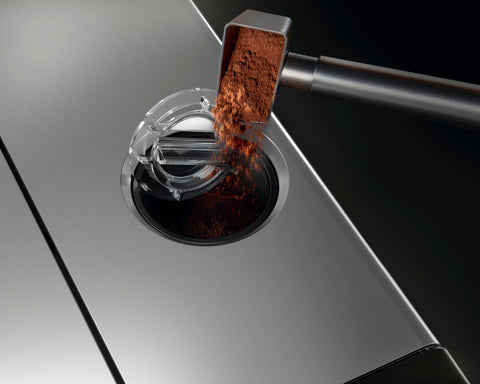
If you want to flavour your espresso or cappuccino, be sure to use syrups that you can to the cup where your espresso or cappuccino is served.
What kinds of beans should you be looking for, you ask?
- Look for beans that are labelled medium to medium/dark roast.
- There’s a reason why medium roast coffees are the world’s most popular. They’re flavourful, not too acidic, and have decent body. Most are a rich, earthy brown and rarely does the oil within the beans rise to the surface. If there is any oil, it will be very slight and not cause for concern.
- Roasting to medium preserves many of the unique flavours of a coffee’s origin. But it also begins to reach into the deep caramel sweetness of a longer roast. As a result, medium roast coffees are balanced, well-rounded.
- Keep in mind that roasting descriptions are at the discretion of the roaster. In some cases, it literally requires opening the bag and examining the beans directly to see how oily they are.
- Buy the freshest possible beans and use the beans within three months of roast date. While roasted beans do not go bad (best before dates are two years from the roasting date) older beans do not provide the most vibrant cup of coffee. In an espresso the crema the beans usually provide may be diminished.
Now you know what oily beans can do to your superautomatic espresso machine. Choosing the right beans will avoid your machine breaking down and requiring costly repairs.
Tell us about the coffee beans you have used with your superautomatic that make a great cup of coffee and are kind to your coffee machine
Related questions
Q: If I have been using oily beans, how can remedy this for my superautomatic espresso machine?
A: Stop using oily beans in your superautomatic right away. Vacuum out any remaining beans in the bean hopper. Put a quarter pound of medium roast coffee beans into the bean hopper and adjust grinder to a coarser setting and attempt making a few cups of coffee. Hopefully this operation will allow the coffee to flow through the system. If you have using oily beans for a long time, you might consider having your machine tuned up by a qualified, factory authorized service center.
Q: How do I keep my coffee beans fresh?
A: Be sure to store you rcoffee beans in an airtight container, at room temperature and away from the light. Do not store your coffee beans in the freezer or the refrigerator. Storing beans in the fridge will cause the beans to absorb flavours of nearby foods. Secondly, the beans will pick up moisture which will clog the grinder in superautomatic espresso machines.
Not to toot our own horn, but at Espresso Machine Experts, we proudly roast our own Caffé Nostro line of espresso beans. Give a bag a try and the see the wonders it can do for your coffee profile and your espresso machine’s long-term sustainability. Read the reviews Caffé Nostro gets from our customers. You will see how much it is loved by those who use it.







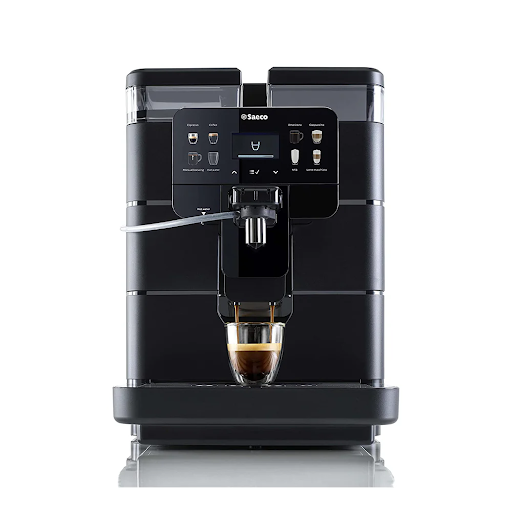
Oh yes. Used oily beans, purchased from machine supplier, and needed to take my machine to service. Jura ENA micro 90. Now use only Lavazza Aroma Top
I have a Saeco machine and haven’t been able to grind beans for some time. I haven’t found a local vendor to provide services here in Dallas.
Do you know anyone who can fix it? Or should I send it to you for service?
Thanks Robert